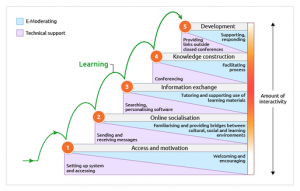Topic 4: Design for online and blended learning
“In essence, inclusive and open pedagogies are rooted in empathy and require that we take a humanistic approach in creating learning experiences” Amanda McAndrew
I have enjoyed this topic, as it talks about the importance of keeping in contact with your students, showing empathy. And I believe that is essential, perhaps even more essential in an online/blended course.
Unfortunately I have heard teachers talk about online courses as courses they only have to publish materials for, and the prejudice than people that chooses an online course knows how to manage it on their own…
We can’t know who our students are in advance or know what kind of learning experiences they have. We should make a course that is more inclusive, that actually is open for everyone. Before working at the university I worked with students with NPF. And the approach mentioned above would never have worked for them. I know that there are many teachers that reach out, and builds learning accesible for many. By reading one of my peers blog I found an interesting article (unfortunately I can’t find the link to her blog right now), Inclusive and Open Pedagogies by Amanda McAndrew, the Educause review. She believes that “a core principle of inclusive pedagogy is valuing diverse experiences, perspectives, and ways of learning that contribute unique meaning to a learning environment and to the world”.
Do we want our students to succeed, or not?
A friend of mine has been a student on an blended university course. They have a few meetings on the University campus, but mostly she’s been on her own. No scheduled meetings with teachers between the meetings. Some group work.
At least she got a study guide in the beginning of the course, a guide to keep her on track. But, the problem is that to her the guide isn’t helpful. She feels that it is hard to read it, and that the text isn’t organized, making it hard to find out when to do different steps. Because of that she missed questions to one assignment. A few months later she was very stressed, she had two assignments to send in the same week. At least she thought, because that is what she read in the study guide that she had printed out the first week. She managed just one for the scheduled time. But going into the website to check something out, and reading the study guide online, she realized that the guide had been altered. The assignment she had sent in, was suddenly a week early, and the other was now late. The strange(?) thing is that she hadn’t received any messages about an updated study guide…
Support through scaffolding
“For online learning to be successful and happy, participants need to be supported through a structured developmental process. ” /Gilly Salmon
 I was happy to read about the Five stage model, were Gilly Salmon invites us to guide our students through the course. In stage one most scaffolding and then with different focus as the course goes on. But you will all the time be there to facilitate the process. If my friends course had been built in this way, she would have had a much better experience, not feeling lost and stressed out.
I was happy to read about the Five stage model, were Gilly Salmon invites us to guide our students through the course. In stage one most scaffolding and then with different focus as the course goes on. But you will all the time be there to facilitate the process. If my friends course had been built in this way, she would have had a much better experience, not feeling lost and stressed out.
Does emotions affect our learning?
Another important insight was the Community of Inquiry, where Marti Cleveland-Innes discussed how our emotions affect our learning. We were asked to bring up our thoughts on the subject on a padlet, and Siv, one of the participants in this course wrote:
“From my own experience, I think a little frustration may make you innovative, you may find the way to a solution in an alternative way maybe” Siv
And I feel it has a lot of truth in it. If everything flowed very smoothly you would most probably continue on the same track as always.
A little frustration or resistance can for sure make you try new ways of solving a problem.
References:
- https://www.gillysalmon.com/five-stage-model.html
- https://padlet.com/laruhs/onl192topic4
- https://er.educause.edu/blogs/2018/11/inclusive-and-open-pedagogies
Images:
- Five stage model. (CC BY-NC-ND 4.0) www.gillysalmon.com/uploads/5/0/1/3/50133443/1617139.png?515
- “scaffolding” – some help along the way, Cecilia Hellekant


 I was happy to read about the
I was happy to read about the 